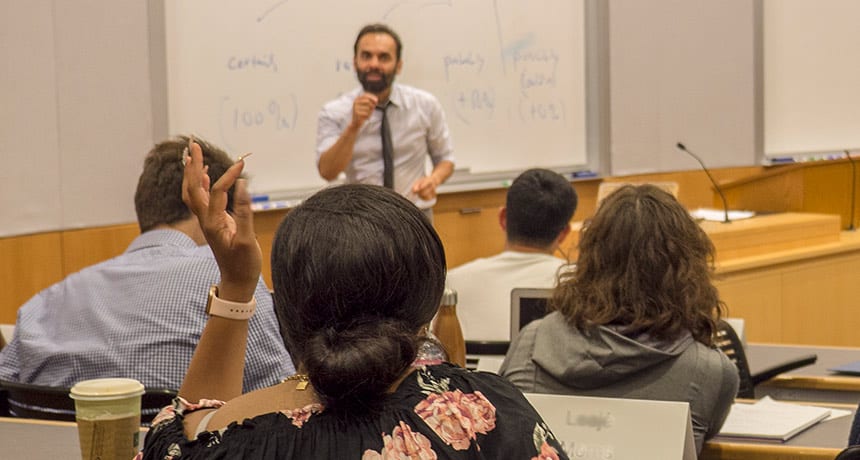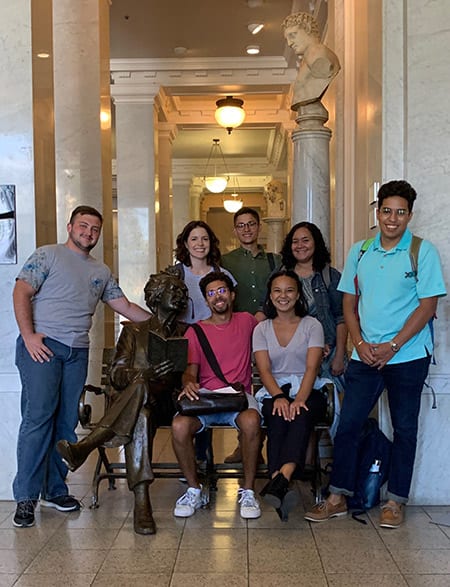
By Rachel DeLetto
What does it mean to be “substantially certain” for purposes of proving the tort of battery? For most 1Ls, learning to identify the legal meaning of common words and phrases and to consider how each rule fits into the “big picture” is an intimidating crash course starting on day one, usually in a lecture hall surrounded by a crowd of equally baffled classmates.
But for a group of 42 incoming Berkeley Law 1Ls, the Pre-Orientation program offers an opportunity to learn to think like a law student in a low-stakes environment.
“Think boot camp, but for law school,” says Diana DiGennaro, director of the Academic Skills Program, which runs the annual “Pre-O.”
The one-week program is designed to orient students to the study of law and help new 1Ls feel prepared, confident, and welcome at Berkeley Law. Students participate in approximately four hours of classes each day, focusing on the basics of legal reasoning and analysis as well as foundational legal concepts.
Classroom exposure
“Forget about the dictionary!” exclaims instructor Talha Syed, who teaches Torts in the 1L curriculum. Syed uses a gentle Socratic approach to surface lessons from the students about how to think, talk, and write about legal requirements based on the language of the case law.
“The classes are very similar to regular law school classes, except that Pre-Orientation instructors step back to explain what they are doing and why they are doing it,” explains DiGennaro. While modeling the Socratic method, for example, an instructor might pause to discuss why law school classes are taught this way and how students should prepare for this type of class discussion.
Incoming 1L Christian McFall says before Pre-O he was terrified of cold-calling. But taking classes with a few different faculty members showed him that “they’re all trying to achieve the same goal: to get us all to be great students and ultimately think like lawyers.” He even learned to appreciate the value of cold-calling. “If you do get an answer wrong, they’re not going to hound you, they’re going to walk you through it and help you get to the right conclusion.”
Pre-O week culminates with a mock exam. But instead of being anxious about it, most students approached their first law school exam as an opportunity. McFall says discussing how to make an outline and going over hypotheticals and then debriefing the practice exam was actually really fun. “I’m definitely going in with more of an understanding of what to expect and will be much more comfortable once exam time comes.”
Impactful experience
Kristen Holmquist, director of Experiential Education, helped design and launch the pre-orientation program in 2012. “The entire law school community is very enthusiastic about giving students more guidance about how to succeed in law school from the very start,” she says. And its impact is demonstrated by its alumni. Participants have gone on to be “editors in chief of California Law Review and Supreme Court clerks. We also have folks who have done tremendous work representing clients through the clinics and pro bono program, and people who are rockstars because they’ve created networks for other underrepresented students,” Holmquist says.

Student Association of Berkeley Law co-president Linda Blair ‘21 is an alumna of the Pre-O program. “I don’t have any lawyers in my family. I don’t know many lawyers. I really didn’t have any conception of what it meant to actually be immersed in the law and what law school was. Those were pretty foreign concepts to me.”
Blair says exposure to what the academic coursework was like and learning how to read and synthesize a case during Pre-O gave her the confidence to dig in to the work once classes started.
Building community
Importantly, DiGennaro says, building community is a key part of Pre-Orientation. “Law school can be stressful and challenging, and having a support system makes a huge difference.”
The Pre-O agenda also includes workshops and programs on financial aid, personal wellness, and effective study techniques. The 1Ls also have the opportunity to spend time with their upper-class peers and build community in both organized and more informal settings.
During a campus-wide scavenger hunt, students from across the country—Utah, Kentucky, North Carolina, California, New Jersey, and Georgia in just one of the six groups—worked together to decipher clues and locate UC Berkeley landmarks, such as a bronze statue of Mark Twain and a cafe named in honor of a famous movement started at UC Berkeley.
“One of the best parts of the experience has been getting to meet new friends before classes start,” says Tiffany Deguzman, an incoming 1L from North Carolina. Starting law school is intimidating, she says, but the “transition will be easier now that I have this group of people who have shared this experience.”
Rising 2L Blair emphatically stresses the collegiality aspect of the Pre-O program. Of course learning what to expect from the academic load was important, but she says making connections with her Pre-O peers was even more valuable. “I found a family, a home here. I made really great friends and that made me feel more comfortable about tackling law school the first year,” Blair says.
The free program is elective and open to all incoming 1Ls by application. Priority is given to students who have been out of school for a number of years, students who are the first in their family to attend college, students for whom English is a second language, students with learning differences, and other students who, for any number of reasons, may find the transition to law school more challenging.
Buth Holmquist thinks the program is a valuable introduction to most any law student. “We invite students to tell us why they think the program would be helpful for them, because there are all kinds of reasons why starting law school can be tough!”
“Every student admitted to Berkeley Law belongs here and can succeed here,” says DiGennaro. Pre-O provides a strong start that helps them feel more comfortable and confident from Day 1, and also fosters that crucial sense of belonging.